- Home
- Jim Butcher
The Dresden Files 3: Grave Peril Page 2
The Dresden Files 3: Grave Peril Read online
Page 2
I hunkered down, kept the little sack of dust gripped loosely in my right hand, and slipped over to the door that led into the roomful of sleeping babies. The ghost did not appear to have noticed me—ghosts aren't terribly observant. I guess being dead gives you a whole different perspective on life.
I entered the room, and Agatha Hagglethorn's voice rolled over me like a drug, making me blink and shudder. I had to keep focused, my thoughts on the cool power of my magic flowing through my pentacle and coming out in its spectral light.
If that diamond ring don't shine …
I licked my lips and watched the ghost as it stooped over one of the rolling cradles. She smiled, loving-kindness in her eyes, and breathed out her song over the baby.
The infant shuddered out a tiny breath, eyes closed in sleep, and did not inhale.
Hush little baby …
Time had run out. In a perfect world, I would have simply dumped the dust onto the ghost. But it's not a perfect world: Ghosts don't have to play by the rules of reality, and until they acknowledge that you're there, it's tough, very, very tough, to affect them at all. Confrontation is the only way, and even then, knowing the shade's identity and speaking its name aloud is the only sure way to make it face you. And, better and better, most spirits can't hear just anyone—it takes magic to make a direct call to the hereafter.
I rose fully to my feet, bag gripped in my hand and shouted, forcing my will into my voice, "Agatha Hagglethorn!"
The spirit started, as though a distant voice had come to her, and turned toward me. Her eyes widened. The song abruptly fell silent.
"Who are you?" she said. "What are you doing in my nursery?"
I struggled to keep the details Bob had told me about the ghost straight. "This isn't your nursery, Agatha Hagglethorn. It's more than a hundred years since you died. You aren't real. You are a ghost, and you are dead."
The spirit drew itself up with a sort of cold, high-society haughtiness. "I might have known. Benson sent you, didn't he? Benson is always doing something cruel and petty like this, then calling me a madwoman. A madwoman! He wants to take my child away."
"Benson Hagglethorn is long dead, Agatha Hagglethorn," I responded, and gathered back my right hand to throw. "As is your child. As are you. These little ones are not yours to sing to or bear away." I steeled myself to throw, began to bring my arm forward.
The spirit looked at me with an expression of lost, lonely confusion. This was the hard part about dealing with really substantial, dangerous ghosts. They were almost human. They appeared to be able to feel emotion, to have some degree of self-awareness. Ghosts aren't alive, not really—they're a footprint in stone, a fossilized skeleton. They are shaped like the original, but they aren't it.
But I'm a sucker for a lady in distress. I always have been. It's a weak point in my character, a streak of chivalry a mile wide and twice as deep. I saw the hurt and the loneliness on the ghost-Agatha's face, and felt it strike a sympathetic chord in me. I let my arm go still again. Perhaps, if I was lucky, I could talk her away. Ghosts are like that. Confront them with the reality of their situation, and they dissolve.
"I'm sorry, Agatha," I said. "But you aren't who you think you are. You're a ghost. A reflection. The true Agatha Hagglethorn died more than a century ago."
"N-no," she said, her voice shaking. "That's not true."
"It is true," I said. "She died on the same night as her husband and child."
"No," the spirit moaned, her eyes closing. "No, no, no, no. I don't want to hear this." She started singing to herself again, low and desperate—no enchantment to it this time, no unconscious act of destruction. But the infant girl still hadn't inhaled, and her lips were turning blue.
"Listen to me, Agatha," I said, forcing more of my will into my voice, lacing it with magic so that the ghost could hear me. "I know about you. You died. You remember. Your husband beat you. You were terrified that he would beat your daughter. And when she started crying, you covered her mouth with your hand." I felt like such a bastard to be going over the woman's past so coldly. Ghost or not, the pain on her face was real.
"I didn't," Agatha wailed. "I didn't hurt her."
"You didn't mean to hurt her," I said, drawing on the information Bob had provided. "But he was drunk and you were terrified, and when you looked down she was gone. Isn't that right?" I licked my lips, and looked at the infant girl again. If I didn't get this done quickly, she'd die. It was eerie, how still she was, like a little rubber doll.
Something, some spark of memory caught a flame in the ghost's eyes. "I remember," she hissed. "The axe. The axe, the axe, the axe." The proportions of the ghost's face changed, stretched, became more bony, more slender. "I took my axe, my axe, my axe and gave my Benson twenty whacks." The spirit grew, expanding, and a ghostly wind rustled through the room, emanating from the ghost, and rife with the smell of iron and blood.
"Oh, crap," I muttered, and gathered myself to make a dash for the girl.
"My angel gone," screamed the ghost. "Benson gone. And then the hand, the hand that killed them both." She lifted the stump of her arm into the air. "Gone, gone, gone!" She threw back her head and screamed, and it came out as a deafening, bestial roar that rattled the nursery walls.
I threw myself forward, toward the breathless child, and as I did the rest of the infants burst into terrified wails. I reached the child and smacked her little upturned baby butt. She blinked her eyes open in sudden shock, drew in a breath, and joined the rest of her nursery mates in crying.
"No," Agatha screamed, "no, no, no! He'll hear you! He'll hear you!" The stump of her left arm flashed out toward me, and I felt the impact both against my body and against my soul, as though she had driven a chip of ice deep into my chest. The power of the blow flung me back against a wall like a toy, hard enough to send my staff and rod clattering to the floor. By some miracle or other, I kept hold of my sack of ghost dust, but my head vibrated like a hammer-struck bell, and cold shivers wracked my body in rapid succession.
"Michael," I wheezed, as loudly as I could, but already I could hear doors being thrown open, heavy work boots pounding toward me. I struggled to my feet and shook my head to clear it. The wind rose to gale force, sending cribs skittering around the room on their little wheels, tearing at my eyes so that I had to shield them with one hand. Dammit. The dust would be useless in such a gale.
"Hush little baby, hush little baby, hush little baby." Agatha's ghost bowed over the infant girl's cradle again, and thrust the stump of her left arm down and into the mouth of the child, her translucent flesh passing seamlessly into the infant's skin. The child jerked and stopped breathing, though she still attempted to cry.
I shouted a wordless challenge and charged the spirit. If I could not cast the dust upon her from across the room, I could thrust the leather bag into her ghostly flesh and pin her into place from within—agonizing, but undoubtedly effective.
Agatha's head whipped toward me as I came, and she jerked away from the child with a snarl. Her hair had come free in the gale and spread about her face in a ferocious mane well suited to the feral features that had replaced her gentle expression. She drew back her left hand, and there suddenly appeared, floating just above the stump, a short, heavy-headed hatchet. She shrieked and brought the hatched down at me.
Ghostly steel chimed on true iron, and Amoracchius's light flared bright-white. Michael slid his feet into position on the floor, gritting his teeth with effort, and kept the spirit-weapon from touching my flesh.
"Dresden," he called. "The dust!"
I fought my way forward, through the wind, shoved my fist into Agatha's weapon-arm, and shook loose some of the ghost dust from the leather sack.
Upon contact with her immaterial flesh, the ghost dust flared into blazing motes of scarlet light. Agatha screamed and jerked back, but her arm remained in place as firmly as if it had been set in concrete.
"Benson!" Agatha shrieked. "Benson! Hush little baby!" And then she simply tor
e herself away from her arm at the shoulder, leaving her spirit flesh behind, and vanished. The arm and hatchet collapsed to the floor in a sudden spatter of clear, semifluid gelatin, the remnants of spirit-flesh when the spirit was gone, ectoplasm that would swiftly evaporate.
The gale died, though the lights continued to flicker. My blue-white wizard light, and the lambent glow of Michael's sword were the only reliable sources of illumination in the room. My ears shrieked with the sudden lack of sound, though the dozen or so babies, in their cribs, continued a chorus of steady, terrified little wails.
"Are the children all right?" Michael asked. "Where did it go?"
"I think so. The ghost must have crossed over," I guessed. "She knew she'd had it."
Michael turned in a slow circle, sword still held at the ready. "It's gone, then?"
I shook my head, scanning the room. "I don't think so," I responded, and bent over the crib of the infant girl who had nearly been smothered. The name on her wrist bracelet read Alison Ann Summers. I stroked her little cheek, and she turned her mouth toward my finger, baby lips fastening on my fingertip, cries dying.
"Take your finger out of her mouth," Michael chided. "It's dirty. What happens now?"
"I'll ward the room," I said. "And then we'll get out of here before the police show up and arres—"
Alison Ann jerked and stopped breathing. Her tiny arms and legs stiffened. I felt something cold pass over her, heard the distant drone of mad lullaby.
Hush little baby …
"Michael," I cried. "She's still here. The ghost, she's reaching here from the Nevernever."
"Christ preserve," Michael swore. "Harry, we have to step over."
My heart skipped a beat at the very thought. "No," I said. "No way. This is a big spook, Michael. I'm not going to go onto her home ground naked and offer to go two out of three."
"We don't have a choice," Michael snapped. "Look."
I looked. The infants were falling silent, one by one, little cries abruptly smothered in mid-breath.
Hush little baby …
"Michael, she'll tear us apart. And even if she doesn't, my godmother will."
Michael shook his head, scowling. "No, by God. I won't let that happen." He turned his gaze on me, piercing. "And neither will you, Harry Dresden. There is too much good in your heart to let these children die."
I returned his stare, uncertain. Michael had insisted that I look him in the eyes on our first meeting. When a wizard looks you in the eyes, it's serious. He can see inside of you, all of your dark secrets and hidden fears of your soul—and you see his in return. Michael's soul had made me weep. I wished that my soul would look like his had to me. But I was pretty damned sure that it didn't.
Silence fell. All the little babies hushed.
I closed the sack of ghost dust and put it away in my pocket. It wouldn't do me any good in the Nevernever.
I turned toward my fallen rod and staff, thrust out my hand, and spat, "Ventas servitas." The air stirred, and then flung staff and rod into my open hands before dying away again. "All right," I said. "I'm tearing open a window that will give us five minutes. Hopefully, my godmother won't have time to find me. Anything beyond that and we're going to be dead already or back here, in any case."
"You have a good heart, Harry Dresden," Michael said, a fierce grin stretching his mouth. He stepped closer to my side. "God will smile on this choice."
"Yeah. Ask Him not to Sodom and Gomorrah my apartment, and we'll be even."
Michael gave me a disappointed glance. I shot him a testy glare. He clamped a hand onto my shoulder and held on.
Then I reached out, caught hold of reality in my fingertips, and with an effort of will and a whispered, "Aparturum," tore a hole between this world and the next.
Chapter Three
Even days that culminate in a grand battle against an insane ghost and a trip across the border between this world and the spirit realm usually start out pretty normally. This one, for example, started off with breakfast and then work at the office.
My office is in a building in midtown Chicago. It's an older building, and not in the best of shape, especially since there was that problem with the elevator last year. I don't care what anyone says, that wasn't my fault. When a giant scorpion the size of an Irish wolfhound is tearing its way through the roof of your elevator car, you get real willing to take desperate measures.
Anyway, my office is small—one room, but on the corner, with a couple of windows. The sign on the door reads, simply, HARRY DRESDEN, WIZARD. Just inside the door is a table, covered with pamphlets with titles like: Magic and You, and Why Witches Don't Sink Any Faster Than Anyone Else—a Wizard's Perspective. I wrote most of them. I think it's important for we practitioners of the Art to keep up a good public image. Anything to avoid another Inquisition.
Behind the table is a sink, counter, and an old coffee machine. My desk faces the door, and a couple of comfortable chairs sit across from it. The air conditioning rattles, the ceiling fan squeaks on every revolution, and the scent of coffee is soaked into the carpet and the walls.
I shambled in, put coffee on, and sorted through the mail while the coffee percolated. A thank you letter from the Campbells, for chasing a spook out of their house. Junk mail. And, thank goodness, a check from the city for my last batch of work for the Chicago P.D. That had been a nasty case, all in all. Demon summoning, human sacrifice, black magic—the works.
I got my coffee and resolved to call Michael to offer to split my earnings with him—even though the legwork had been all mine, he and Amoracchius had come in on the finale. I'd handled the sorcerer, he'd dealt with the demon, and the good guys won the day. I'd turned in my logs and at fifty bucks an hour had netted myself a neat two grand. Michael would refuse the money (he always did) but it seemed polite to make the offer; especially given how much time we'd been spending together recently, in an attempt to track down the source of all the ghostly happenings in the city.
The phone rang before I could pick it up to call Michael. "Harry Dresden," I answered.
"Hello there, Mr. Dresden," said a warm, feminine voice. "I was wondering if I could have a moment of your time."
I kicked back in my chair, and felt a smile spreading over my face. "Why, Miss Rodriguez, isn't it? Aren't you that nosy reporter from the Arcane? That useless rag that publishes stories about witches and ghosts and Bigfoot?"
"Plus Elvis," she assured me. "Don't forget the King. And I'm syndicated now. Publications of questionable reputation all over the world carry my column."
I laughed. "How are you today?"
Susan's voice turned wry. "Well, my boyfriend stood me up last night, but other than that …"
I winced a little. "Yeah, I know. Sorry about that. Look, Bob found a tip for me that just couldn't wait."
"Ahem," she said, in her polite, professional voice. "I'm not calling you to talk about my personal life, Mr. Dresden. This is a business call."
I felt my smile returning. Susan was absolutely one in a million, to put up with me. "Oh, beg pardon, Miss Rodriguez. Pray continue."
"Well. I was thinking that there were rumors of some more ghostly activity in the old town last night. I thought you might be willing to share a few details with the Arcane."
"Mmmm. That might not be wholly professional of me. I keep my business confidential."
"Mr. Dresden," she said. "I would as soon not resort to desperate measures."
"Why, Miss Rodriguez." I grinned. "Are you a desperate woman?"
I could almost see the way she arched one eyebrow. "Mr. Dresden. I don't want to threaten you. But you must understand that I am well acquainted with a certain young lady of your company—and that I could see to it that things became very awkward between you."
"I see. But if I shared the story with you—"
"Gave me an exclusive, Mr. Dresden."
"An exclusive," I amended, "then you might see your way clear to avoiding causing problems for me?"
"I'd even put in a good word with her," Susan said, her voice cheerful, then dropping into a lower, smokier register. "Who knows. You might get lucky."
I thought about it for a minute. The ghost Michael and I had nailed last night had been a big, bestial thing lurking in the basement of the University of Chicago library. I didn't have to mention the names of any people involved, and while the university wouldn't like it, I doubted it would be seriously hurt by appearing in a magazine that most people bought along with every other tabloid in the supermarket checkout lines. Besides which, just the thought of Susan's caramel skin and soft, dark hair under my hands … Yum. "That's an offer I can hardly refuse," I told her. "Do you have a pen?"
She did, and I spent the next ten minutes telling her the details. She took them down with a number of sharp, concise questions, and had the whole story out of me in less time than I would have believed. She really was a good reporter, I thought. It was almost a shame that she was spending her time reporting the supernatural, which people had been refusing to believe in for centuries.
"Thank you very much, Mr. Dresden," she said, after she squeezed the last drips of information out of me. "I hope things go well between you and the young lady tonight. At your place. At nine."
"Maybe the young lady would like to discuss the possibilities with me," I drawled.
She let out a throaty laugh. "Maybe she would," Susan agreed. "But this is a business call."
I laughed. "You're terrible, Susan. You never give up, do you?"
"Never, ever," she said.
"Would you really have been mad at me if I hadn't told you?"
"Harry," she said. "You stood me up last night without a word. I don't usually stand for that kind of treatment from any man. If you hadn't had a good story for me, I was going to think that you were out horsing around with your friends."
"Yeah, that Michael." I chuckled. "He's a real party animal."

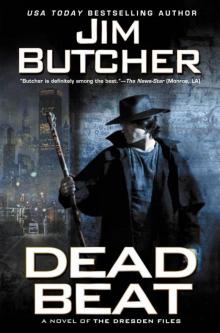 Dead Beat
Dead Beat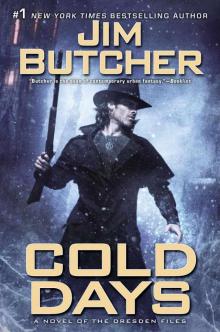 Cold Days
Cold Days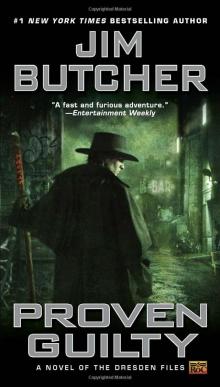 Proven Guilty
Proven Guilty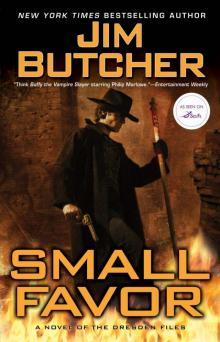 Small Favor
Small Favor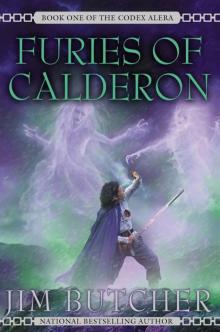 Furies of Calderon
Furies of Calderon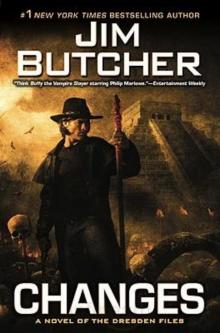 Changes
Changes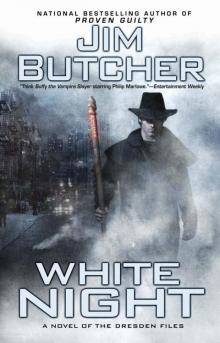 White Night
White Night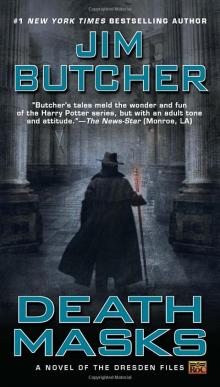 Death Masks
Death Masks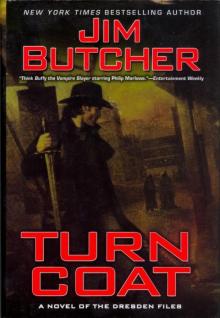 Turn Coat
Turn Coat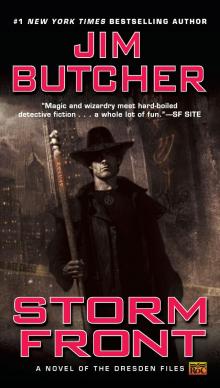 Storm Front
Storm Front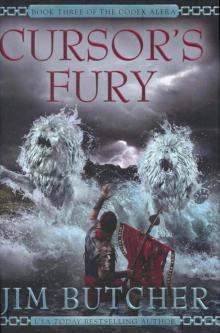 Cursor's Fury
Cursor's Fury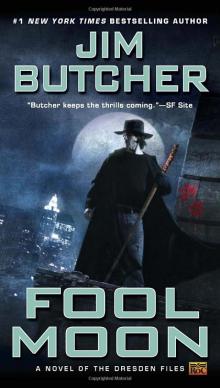 Fool Moon
Fool Moon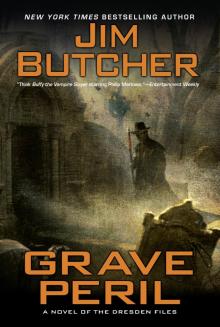 Grave Peril
Grave Peril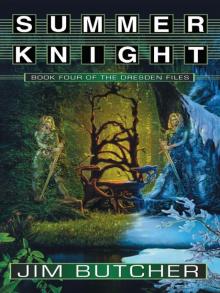 Summer Knight
Summer Knight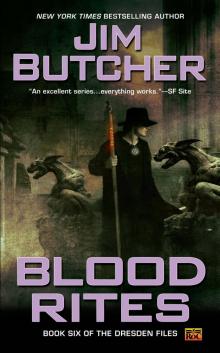 Blood Rites
Blood Rites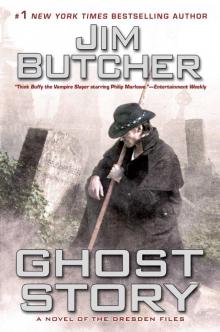 Ghost Story
Ghost Story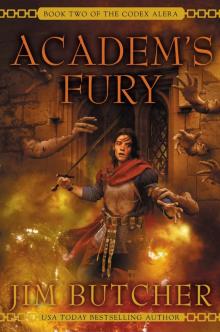 Academs Fury
Academs Fury Princeps' Fury
Princeps' Fury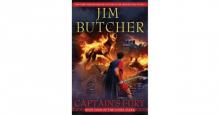 Captains Fury
Captains Fury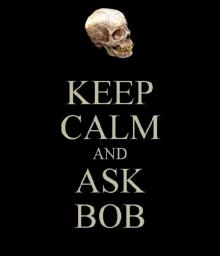 Jim Butcher - Dresden Files Omnibus
Jim Butcher - Dresden Files Omnibus Christmas Eve
Christmas Eve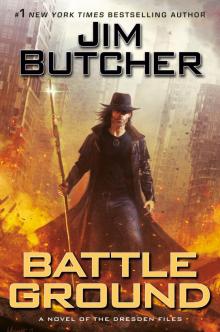 Battle Ground
Battle Ground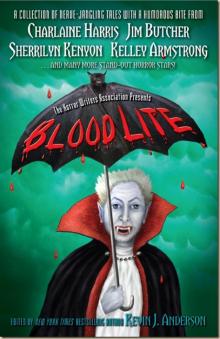 Blood Lite
Blood Lite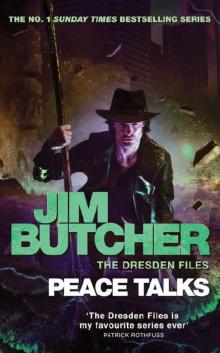 Peace Talks
Peace Talks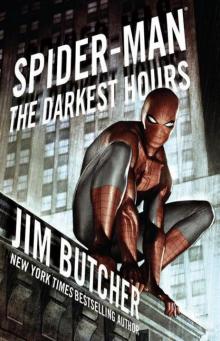 Spider-Man - The Darkest Hours
Spider-Man - The Darkest Hours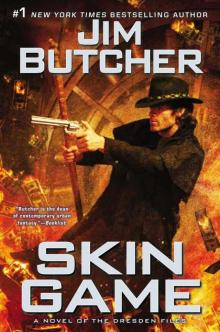 Skin Game
Skin Game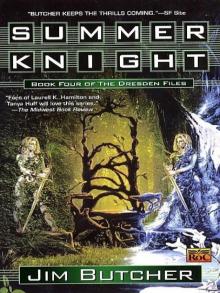 The Dresden Files 4: Summer Knight
The Dresden Files 4: Summer Knight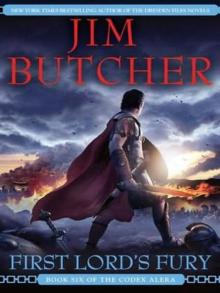 First Lord's Fury ca-6
First Lord's Fury ca-6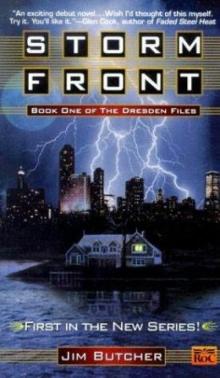 Storm Front df-1
Storm Front df-1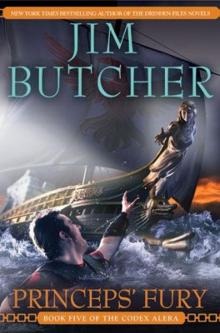 Princeps Fury ca-5
Princeps Fury ca-5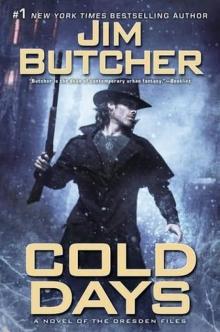 Cold Days df-14
Cold Days df-14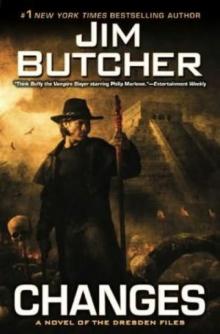 Changes df-12
Changes df-12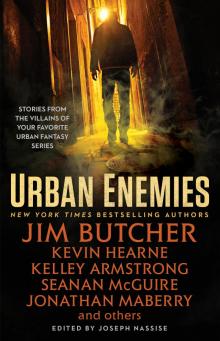 Urban Enemies
Urban Enemies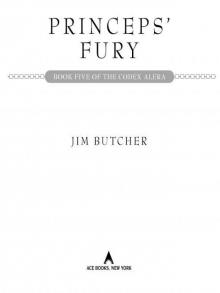 Princeps' Fury (Codex Alera)
Princeps' Fury (Codex Alera)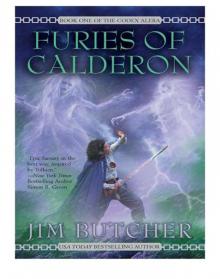 Codex Alera 01 - Furies of Calderon
Codex Alera 01 - Furies of Calderon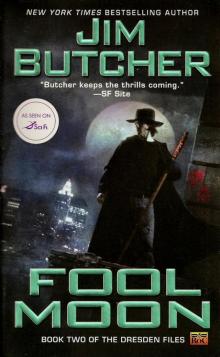 Dresden Files 02 - Fool Moon
Dresden Files 02 - Fool Moon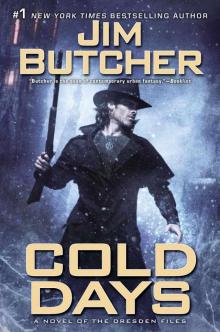 Cold Days: A Novel of the Dresden Files
Cold Days: A Novel of the Dresden Files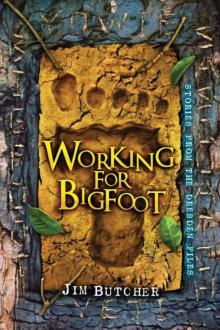 Working for Bigfoot
Working for Bigfoot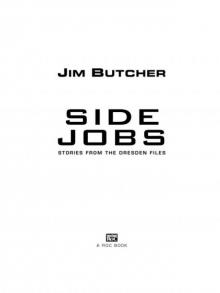 Side Jobs
Side Jobs Even Hand
Even Hand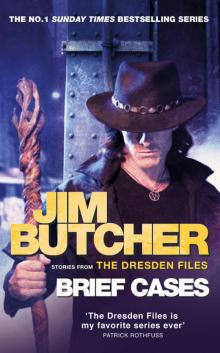 Brief Cases: The Dresden Files
Brief Cases: The Dresden Files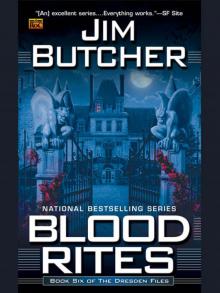 Blood Rites: Book Six of the Dresden Files
Blood Rites: Book Six of the Dresden Files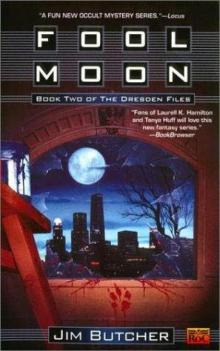 Fool Moon df-2
Fool Moon df-2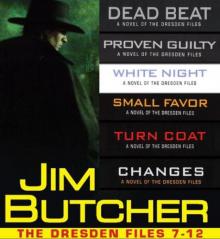 The Dresden Files Collection 7-12
The Dresden Files Collection 7-12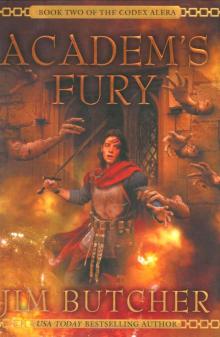 Academ's Fury ca-2
Academ's Fury ca-2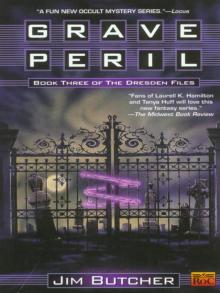 The Dresden Files 3: Grave Peril
The Dresden Files 3: Grave Peril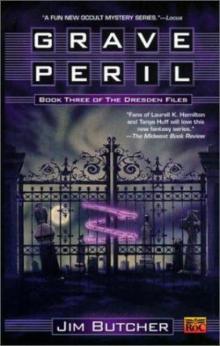 Grave Peril df-3
Grave Peril df-3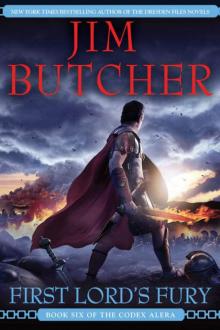 Codex Alera 06 - First Lord's Fury
Codex Alera 06 - First Lord's Fury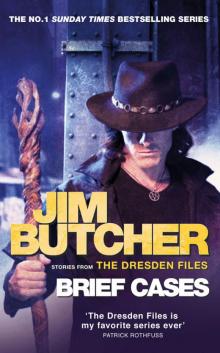 Brief Cases
Brief Cases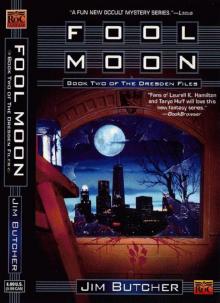 Dresden Files Book 02: Fool Moon
Dresden Files Book 02: Fool Moon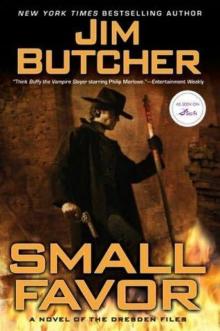 SMALL FAVOR tdf-10
SMALL FAVOR tdf-10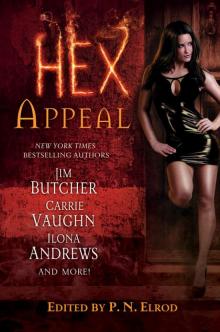 Bigfoot on Campus
Bigfoot on Campus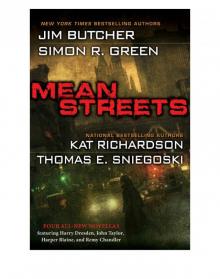 Mean Streets
Mean Streets Dead Beat df-7
Dead Beat df-7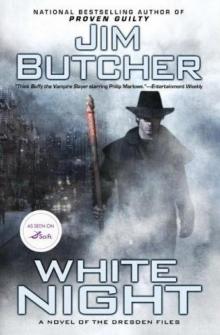 White Night df-9
White Night df-9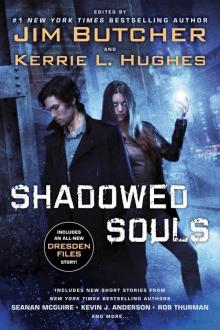 Shadowed Souls
Shadowed Souls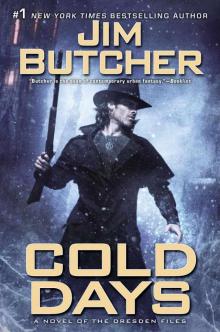 Dresden Files 14 - Cold Days
Dresden Files 14 - Cold Days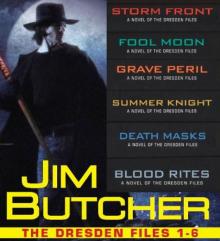 The Dresden Files Collection 1-6
The Dresden Files Collection 1-6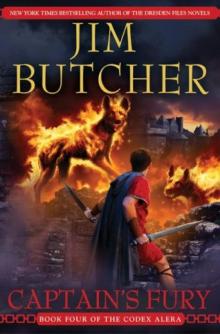 Captain's Fury ca-4
Captain's Fury ca-4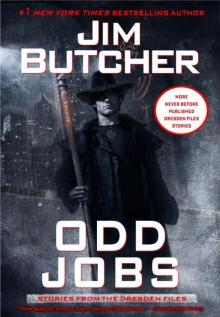 Odd jobs sftdf-2
Odd jobs sftdf-2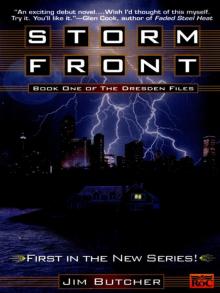 The Dresden Files 1: Storm Front
The Dresden Files 1: Storm Front Blood Rites df-6
Blood Rites df-6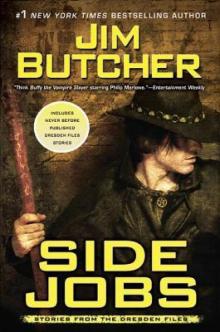 Side Jobs: Stories from the Dresden Files
Side Jobs: Stories from the Dresden Files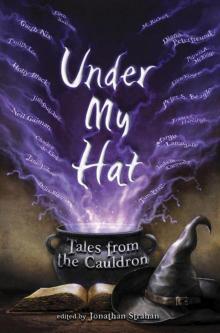 B is for Bigfoot
B is for Bigfoot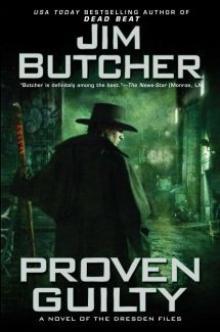 Proven Guilty df-8
Proven Guilty df-8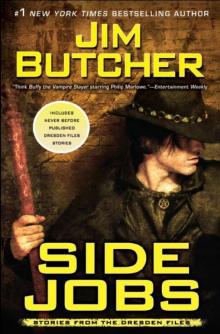 Dresden Files SSC01 - Side Jobs
Dresden Files SSC01 - Side Jobs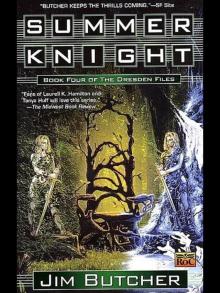 Summer Knight: Book Four of the Dresden Files
Summer Knight: Book Four of the Dresden Files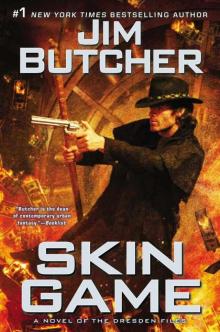 Skin Game: A Novel of the Dresden Files
Skin Game: A Novel of the Dresden Files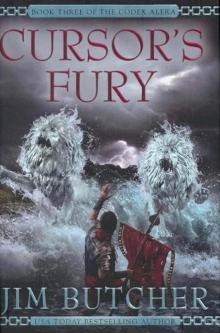 Cursors's Fury ca-3
Cursors's Fury ca-3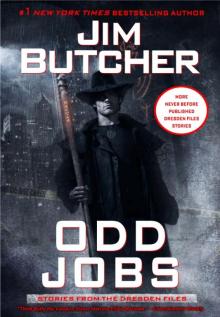 Dresden Files SSC02 - Odd Jobs
Dresden Files SSC02 - Odd Jobs Death Masks df-5
Death Masks df-5 Restoration of Faith (the dresden files)
Restoration of Faith (the dresden files)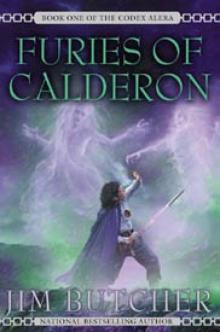 Furies of Calderon ca-1
Furies of Calderon ca-1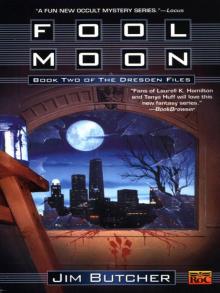 The Dresden Files 2: Fool Moon
The Dresden Files 2: Fool Moon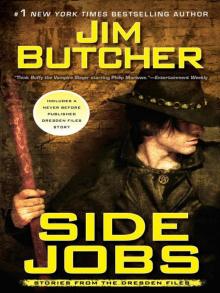 Dresden files:Side jobs (dresden files:short stories)
Dresden files:Side jobs (dresden files:short stories) I Was a Teenage Bigfoot
I Was a Teenage Bigfoot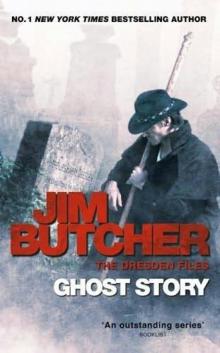 Ghost Story df-13
Ghost Story df-13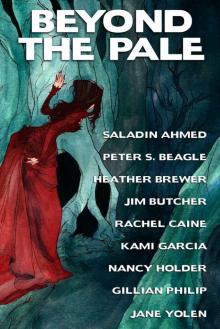 Beyond the Pale: A fantasy anthology
Beyond the Pale: A fantasy anthology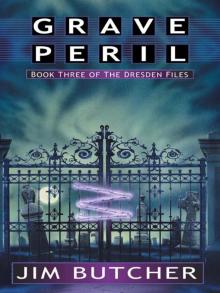 Dresden Files 03 - Grave Peril
Dresden Files 03 - Grave Peril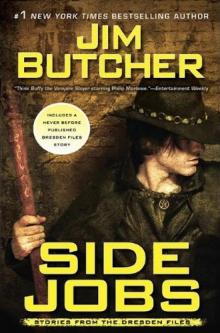 Side Jobs df-13
Side Jobs df-13